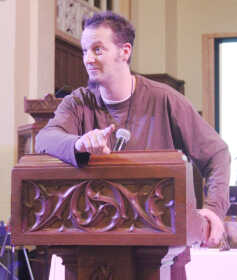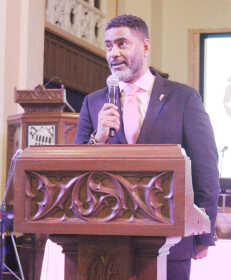Claiborne, Rev. Moss take death penalty, doing justice to task

This is the first of a two-part story on the recent Mendenhall Lecture event.
In the essence of what constitutes the work of justice for him, the overarching question asked by Rev. Otis Moss III last Sunday evening was this: What does the Lord require?
The ramifications of that question set the tone for this year’s two-night Mendenhall Lecture event at Gobin Memorial United Methodist Church. This is as Moss and activist Shane Claiborne challenged the purpose of the death penalty and notions of freedom as yet to be fulfilled.
Claiborne came to Greencastle from Philadelphia, where he has called home for the last 25 years. His roots, though, are decidedly elsewhere in Tennessee. Indeed, his grandparents grew up on the same hillside as country music legend Dolly Parton.
“Where we sit determines what we see, and I fell in love with Jesus in East Tennessee,” Claiborne said. “But I also began to be shaped by some of the residue of racism and of our history.”
He related how friends at college called out the Confederate flag on his high school yearbook. It dawned on him then that his hometown was still segregated. A statue of Confederate general Nathan Bedford Forrest, who was also the Klu Klux Klan’s first Grand Wizard, stood until two years ago.
“It’s an irony that in the United States, you can be pro-guns, pro-death penalty, pro-war and still say you’re pro-life as long as you’ve got abortion,” Claiborne said as to developing his convictions. “I began to see that in my own life, and I wanted to be a bigger champion for life.”
Holding up a cross he wrought out of a gun barrel, he related that as said in Philadelphia, the cross and the gun give two different versions of power: One says, “I’m willing to kill,” while the other says, “I’m willing to die.”
Wrestling as such with loving one’s enemies standing stark to holding one’s ground, Claiborne turned his advocacy to the death penalty. As he found out, Christians are its biggest supporters, just as the overwhelming majority of executions occur in the Bible Belt.
He noted that the first instance of the word “sin” in the Bible occurs in the narrative of Cain killing his brother Abel. As it is expressed, Abel’s blood “cried out” to God from the ground.
“There’re consequences to murder, but God chose mercy,” Claiborne said. “He’s (Cain is) punished, but he’s allowed to live, and eventually allowed to have a family and build a city. Grace gets the last word.”
The legacy of violence, Claiborne related, continued with Moses and David, with the latter perhaps being the most egregious in the Old Testament. Then there is Saul of Tarsus (who became the Apostle Paul) in the New Testament, called by God despite his persecution of early Christians.
The redeeming factor, Claiborne suggested, is that Jesus Christ upheld this legacy. For him, if a murderer is beyond redemption, much of the Bible would be ripped up if it was not for grace.
“I know we’re not all probably Christian in this room, we probably come from lots of different strings of faith or no faith at all, but we’ve got to counter the bad theology,” he said.
Pushing back against the commandment of an eye for an eye, Claiborne took inspiration from divinity that such may not be the best version of justice. He referenced Jesus humbling the mob about to stone a woman accused of adultery.
“As we think about the value of life, as we think about the residue of racism and the blood that still cries out to God from the ground, the invitation for us is to see that at the center of our faith, is one who put violence on display,” he yearned.

Moss, who preaches at Trinity United Church of Christ in Chicago, first made reference to embodiment, or practicing one’s spirituality in ways to affect change. He in turn quoted a poem by Anita Scott Coleman, who characterized Black people as, “the tall trees that remain standing in a forest after a fire.”
Moss offered a message in the same manner as Martin Luther King Jr. when he spoke at the church in September 1960. While King read an open letter by Paul addressed to Christian churches, Moss relayed the Old Testament prophet Micah.
“As I once uttered to the ancestral children of Israel, I speak to you: What does the Lord require of you, who occupy space in these not-yet United States of America?” Moss channeled.
Through Moss, Micah put forward whether God would be pleased by the market’s “golden calves,” taxing the poor to relieve the rich, disparities in incarceration among the poor and people of color and privatization of prisons. He found hypocrisy, as he saw it, in the guise of those notions of freedom.
He declared that a corrupt nature exists in the nation’s “civic soul.” This is as he criticized the “totality” of its history not being taught, and of an irony in extolling freedom with slavery still resonating in the background.
“Phonetically, policymakers have subconsciously mispronounced the word, and allowed a double entendre every time they speak the word ‘justice’ in civic discourse, because they’re saying, ‘Just us,’” Moss iterated.
He related that theology has, in the words of King, become the taillight and not the headlight. This is as the nation has become a capitalistic one, “that likes wearing ecclesiastical garments.”
To do justice, Micah provided, means truth-telling from people of all walks of life, origins and professions. Part of this, he stipulated, is seeing that humility and hubris cannot occupy the same space together.
“One must understand that humility is not humiliation,” Micah stated through Moss. “Humility sets us free, to do what is important in the space that God calls us to walk. Humility removes the space for -isms, and counters this work so that God can work.”
As spoken through Moss, Micah, as “a resident of heaven still looking down,” tasked that the Lord requires all Christians to act justly, to love mercy and to walk humbly with God.
